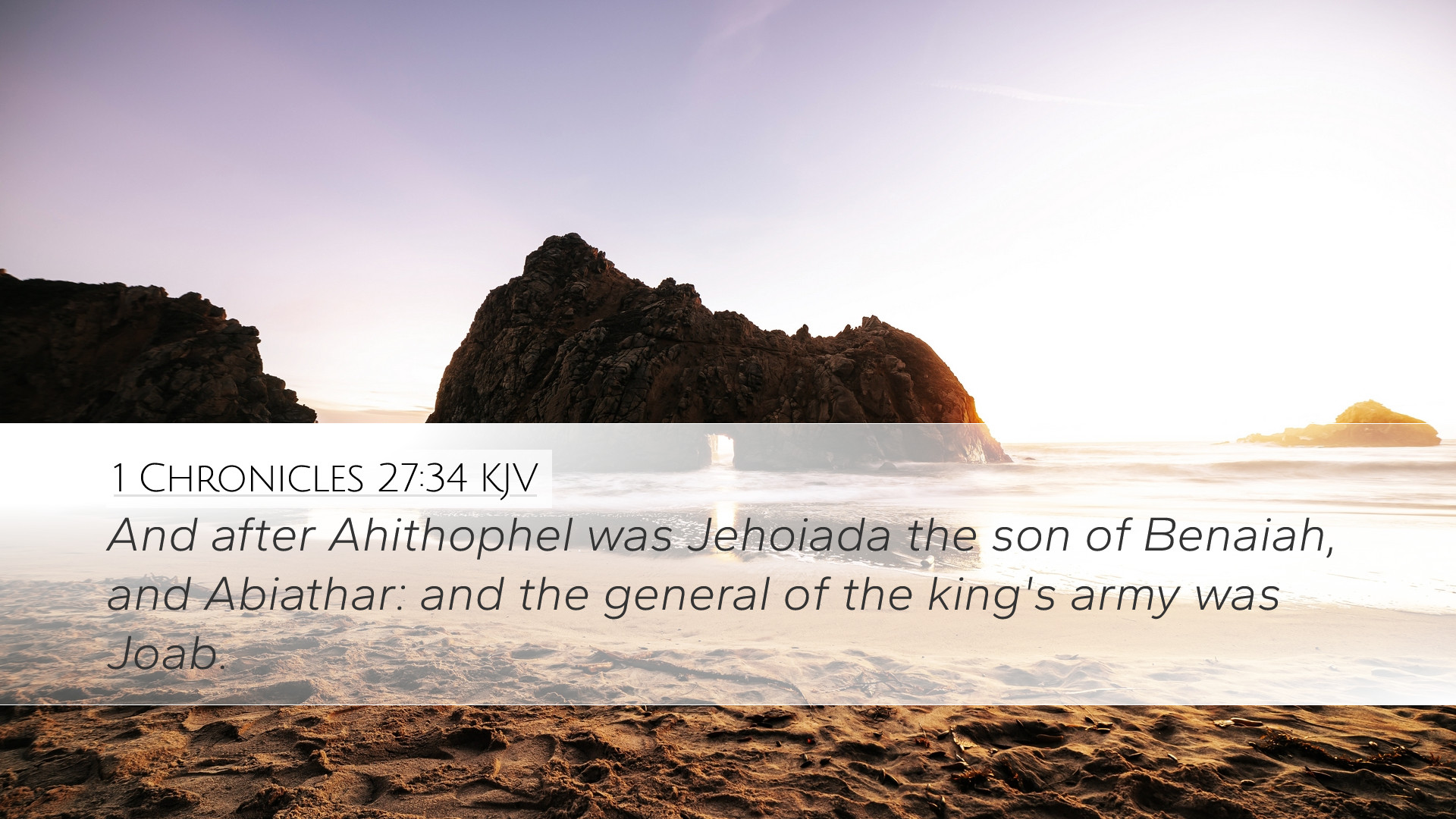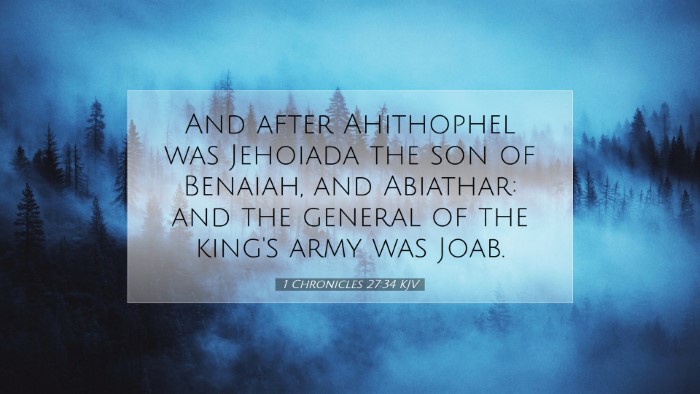Commentary on 1 Chronicles 27:34
1 Chronicles 27:34 states: "And Ahithophel was the king's counsellor: and Hushai the Archite was the king's companion."
This verse highlights the importance of wise counsel and supportive companionship in the context of leadership, particularly during the reign of King David.
Overview
The chapter outlines the organization of David's kingdom and the various officials who supported him in governance.
The mention of Ahithophel and Hushai reveals the dynamics of counsel and friendship critical to David's rule.
The Role of Counsellors in Leadership
Counsellors are pivotal in guiding leaders to make informed decisions.
Applying insights from Matthew Henry, it is evident that Ahithophel was known for his wisdom and strategic advice.
This context emphasizes the quality and importance of having capable advisors.
-
Ahithophel's Reputation: He was esteemed as a man whose counsel was regarded almost as oracles of God, showcasing the authority and impact a wise advisor carries.
-
Korruption of Counsel: Tragically, Ahithophel's advice later led to treachery, which brings forth the notion that even excellent counsel must be aligned with righteousness and the moral compass of leadership.
The Significance of Companionship
Hushai, referred to as “the king’s companion,” serves as a reminder of the importance of loyalty and relational support among leaders.
Albert Barnes elaborates on this by suggesting that Hushai provided not just counsel but also friendship, helping to nurture a sense of community around David.
-
Emotional Support: Hushai’s presence emphasizes the necessity of having companions who can offer both guidance and emotional reprieve during the pressures faced by leaders.
-
Strategic Companion: Hushai played a key role during Absalom's rebellion, using his friendship to counteract Ahithophel’s advice and protect David's throne.
The Contrast Between Ahithophel and Hushai
The contrasting natures of Ahithophel and Hushai provide rich material for pondering the types of counsel one may receive in leadership.
While Ahithophel’s counsel was characterized by sharpness and potential malevolence, Hushai represented a more cautious and loyal approach.
-
Wisdom vs. Loyalty: The tension between wisdom and loyalty draws attention to a leader’s need to discern between advice that is strategically sound but ethically questionable, as opposed to loyalty that seeks the greater good.
-
Dependence on God: Above all, both advisers exemplify the dependency on divine wisdom, emphasizing that ultimately, it is God who guides the affairs of men.
Theological Reflections
The verse prompts theological reflection on the nature of divine providence.
As Adam Clarke notes, God orchestrates events and individuals in our lives for the fulfillment of His purposes.
This suggests that God uses both Ahithophel’s shrewdness and Hushai’s loyalty to work towards His overarching plan.
-
God's Sovereignty: This narrative exemplifies God’s sovereign control in using diverse characters for His glory and the continued prosperity of Israel under David’s reign.
-
Christian Leadership: Christian pastors and leaders today should reflect on the counsel and companionship they cultivate within their own ministries, seeking to align their actions with God’s divine guidance.
Practical Applications for Leaders
For pastors, students, and theologians, this verse and its context provide numerous lessons on leadership and decision-making.
-
Cultivate Wise Counsel: Align oneself with wise, godly advisors who uphold ethical standards while providing sound advice.
-
Encourage Fellowship: Foster a culture of companionship among leaders and followers within the church or ministry, emphasizing loyalty, support, and open communication.
-
Discernment in Relationships: Assess the motives behind advice given by close companions; ensure they align with biblical principles and God's will.
-
Reliance on Prayer: In times of uncertainty, leaders must vehemently seek God’s guidance in prayer to discern the right path, taking heed of the influences surrounding them.
Conclusion
In conclusion, 1 Chronicles 27:34 provides a salient illustration of the multifaceted role of counsel and companionship in leadership.
Recognizing the strengths and weaknesses inherent in both kinds of advisors enriches our understanding of leadership dynamics,
and encourages a reliance on God’s guidance for all decisions made.


